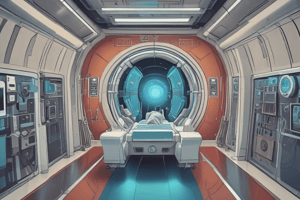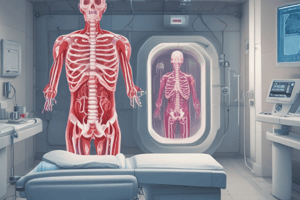Podcast
Questions and Answers
What is one key advantage of CT scans over other diagnostic methods?
What is one key advantage of CT scans over other diagnostic methods?
- Limited applications
- Long waiting time
- Short study time (correct)
- Low image quality
Which aspect of CT scans allows for the accurate diagnosis of various conditions?
Which aspect of CT scans allows for the accurate diagnosis of various conditions?
- Slow examination process
- Low-quality images
- High-quality images (correct)
- Long waiting time
In which surgical setting can CT scans be performed during surgery to guide the surgeon in real-time?
In which surgical setting can CT scans be performed during surgery to guide the surgeon in real-time?
- Intraoperative applications (correct)
- Non-operative applications
- Preoperative applications
- Postoperative applications
Why are CT scans a preferred option for patients with pacemakers, programmable pumps, or shunts?
Why are CT scans a preferred option for patients with pacemakers, programmable pumps, or shunts?
What is one disadvantage associated with CT scans?
What is one disadvantage associated with CT scans?
Why might some patients be concerned about the disadvantages of CT scans?
Why might some patients be concerned about the disadvantages of CT scans?
What is one of the key drawbacks of CT scans, as mentioned in the text?
What is one of the key drawbacks of CT scans, as mentioned in the text?
Why might MRI be preferred over CT scans in certain cases?
Why might MRI be preferred over CT scans in certain cases?
What complication is associated with gadolinium-based contrast agents?
What complication is associated with gadolinium-based contrast agents?
Which aspect of CT scans might obscure important details on images?
Which aspect of CT scans might obscure important details on images?
How do CT scans excel compared to MRI imaging?
How do CT scans excel compared to MRI imaging?
What technological advancement may help improve the safety of CT scans in the future?
What technological advancement may help improve the safety of CT scans in the future?
Flashcards are hidden until you start studying
Study Notes
Advantages of CT Scans
Computed tomography (CT) scans have become a cornerstone of modern medical imaging, offering several advantages over other diagnostic methods. Some key benefits include:
-
Short Study Time: A CT scan typically takes between 15 to 20 minutes. This quick examination time makes it an ideal choice for emergency situations and patients who need immediate results.
-
High-Quality Images: CT scans provide detailed cross-sectional images that offer enhanced clarity and more information than conventional X-ray examinations. These high-quality images can help radiologists accurately diagnose various conditions and plan treatments accordingly.
-
Versatility: CT scans are used in a wide range of applications, including the detection of bone fractures, tumors, and abdominal issues. They are also used as part of cancer screening programs, such as low-dose CT lung screening for early lung cancer detection.
-
Intraoperative Applications: In some surgical procedures, CT scans can be performed during surgery to guide the surgeon in real-time. This allows for precise placement of implants or drains in complex cases.
-
Safety Considerations: Unlike magnetic resonance imaging (MRI), CT scans can be safely used with pacemakers, programmable pumps, or shunts. This makes them a preferred option for patients with these devices.
Disadvantages of CT Scans
Despite their numerous benefits, there are also disadvantages associated with CT scans. Some drawbacks include:
-
Radiation Exposure: CT scans involve exposure to ionizing radiation, which may cause small increases in a person's lifetime risk of developing cancer, particularly in children and younger individuals. It is essential to ensure that doses are kept as low as possible while still providing effective diagnosis or treatment planning.
-
Contrast Agents: Contrast agents may be used to enhance image quality, but they carry the potential for allergic reactions in some patients. Additionally, nephrogenic systemic fibrosis has been linked to gadolinium-based contrast agents, although this risk is now considered very rare.
-
Limited Soft Tissue Visualization: While CT scans excel at depicting bony structures and blood vessels, they may not be as effective in visualizing soft tissue lesions, especially when they overlap with normal structures. Magnetic resonance imaging (MRI) might be a better choice in such cases, as it provides superior soft tissue contrast without ionizing radiation.
-
Artifact Creation: CT scans can produce artifacts, or false images, due to metal implants or certain types of breast implants. These artifacts may obscure important details on the images, making interpretation difficult.
In conclusion, CT scans have revolutionized diagnostic decision making in medicine by providing detailed images quickly. However, they do come with concerns regarding radiation exposure and potential complications from contrast agents. As technology continues to advance, strategies like iterative reconstruction techniques and automated dose control may further improve the safety and effectiveness of CT scanning.
Studying That Suits You
Use AI to generate personalized quizzes and flashcards to suit your learning preferences.



